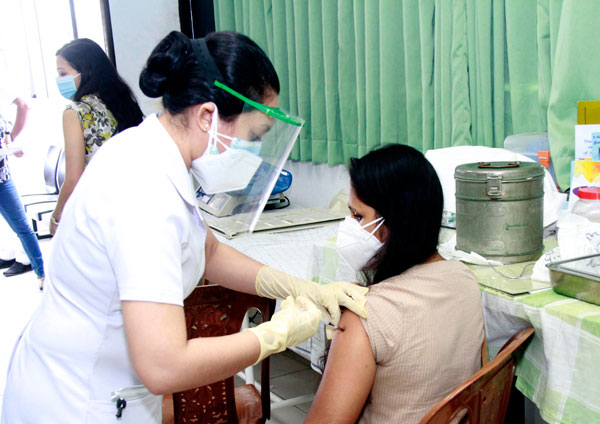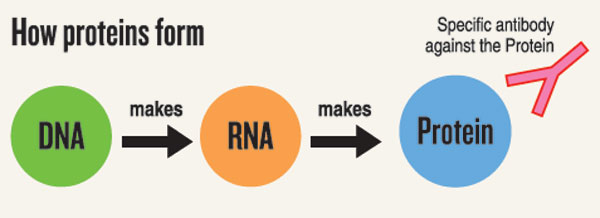News
The ins and outs of a Covid-19 vaccination
The immune system is programmed to tolerate proteins that belong to the host (you) and mount an ‘immune response’ against proteins that don’t belong. The ‘immune response’ means antibodies and other cells are formed that attack the foreign protein and neutralise it. Remember, the immune system doesn’t recognise whole microorganisms, just parts of it like proteins that make up its structure.
What this means for us is that we don’t need to get the infection for our immune system to mount an immune response. If we can get those proteins from the microbe into us, the same process will happen without the risk of infection and we will become immune. This is the principle of vaccination.

A health worker inoculates a woman with a dose of the Chinese SinoPharm vaccine during a Vaccination Programme at the MoH Office in Wellawatta on June, 2. (Pic by Indika Handuwala)
How proteins form
This starts with a gene as all proteins are coded for by DNA. The DNA is ‘transcribed’ into RNA, and the RNA is ‘translated ‘into proteins.
Let’s say we want to introduce a foreign protein that belongs to a germ into the body so that we will develop an immune response to it. What can we do? We can either kill/inactivate the germ and introduce the whole germ into the body; this way there will be lots of proteins (as germs are made up of many proteins) for the immune system to recognise and attack. This is what the SinoPharm (BBIBP-CorV.) inactivated vaccine does.
Another option is to give the RNA that codes for a specific protein of the germ. In this case, scientists have decided that the spike protein of the SARS-COV2 virus is the best target, as this is the protein responsible for getting the virus into our cells. If a vaccine contained the RNA that coded for the spike protein was given, that would work. This is what the Pfizer and Moderna vaccines do. But RNA is very unstable and breaks down easily, so we have to store those vaccines at very low temperatures like -800C.
Another option is to give the DNA of the spike protein. This is done using a vehicle to carry it. A harmless virus is used as a transport vehicle (like a lorry) to carry the DNA of the spike protein into the cells. The cells then take over production of the spike protein. The DNA that is given in the vaccine doesn’t mix with our DNA so you don’t have to worry about that. You also won’t get a cold or other disease from the lorry-like virus as those have been inactivated. It’s safe. This is what the AstraZeneca and Sputnik V vaccines do.
So basically, the Pfizer, Moderna, AstraZeneca and Spunik V vaccines all give the raw materials we need to form the spike protein in our own cells. This is what our immune system recognises. The Sinopharm vaccine directly gives us the whole spike protein, as well as many other proteins for us to develop immunity. So, it’s a little different in that way.
Who can take it?
The only real contra-indication (meaning people who can get the vaccine) are for those who have allergies to the vaccine components. Vaccines are made up of different biochemicals, and if you have had allergies to one of those biochemicals before, then you shouldn’t get the vaccine. Other than that, the vaccines are recommended for everyone, except children, as these have not been tested in kids. The vaccines should be given to persons who have other allergies. If you have an allergy, you need to tell the health care workers giving the vaccine that you have such a problem, but you can still get the vaccine. You will be monitored closely for a reaction. The vaccine is also recommended for lactating mothers. The mothers will then pass on antibodies to their breast-fed child via milk and this will protect the child as well. Having diabetes or heart disease is not a reason to avoid vaccination. Any of the vaccines are considered safe for people with underlying diseases. In pregnancy, the choice is given to the mother to decide after discussion with the doctor. The vaccines have not been tested on pregnant mothers specifically, but so far there is no indication that it is unsafe for pregnancy and there is no increased rate of miscarriages etc. You certainly don’t need to postpone pregnancy just because you get the vaccine.
Which vaccine?
Any vaccine as soon as it is available to you. The efficacy numbers you hear about for each vaccine will be different, but remember you can’t compare those numbers to each other. They were generated by trails done in different countries in different situations. All the vaccines are effective. That’s why they are being given.
First dose immunity vs second dose immunity
After you get the first dose, you will probably generate some level of antibodies in your body. These may last for a few months and then start to decrease. We give the second dose as a booster shot to increase immunity (immune boosting) so it will last for longer. At the moment, we are not sure how long immunity will last after two doses, but it’s likely that it will last for about a year or so. So, if you have had the first dose, you do need the second dose, but don’t panic if you can’t get the second dose exactly on time. A little delay of a month or two doesn’t matter, and you should still be reasonably protected. Don’t rush off to start getting vaccinated with another vaccine just yet. You will be advised on what to do.
Mixing vaccines
The only data we have so far is a press release saying that trials of giving the AstraZenaca vaccine, followed by the Pfizer vaccine, boosts immunity very well and other than a little bit of increase in side effects, it is safe. So, getting the Pfizer vaccine as a second dose for people in Sri Lanka who have received the Astra Zenaca/Covishield first dose is an option.
Protection from variants
All the vaccines give some protection against the variant forms of the virus but the degree of protection varies according to variant and vaccine. Two doses of the Astra Zeneca and Pfizer vaccines seem to be protective against the Indian variant and the UK variant, while the Sputnik V manufacturers claim efficacy against UK variant, thought this is unverified and unpublished.
Stopping disease vs reduction in symptoms
All the vaccines have some level of efficacy. This means they will prevent disease in most people. But there will be some breakthrough cases as we have seen in Sri Lanka too. The advantage of having a vaccine is that all the vaccines have shown prevention of severe disease. This is a fantastic advantage at the moment.
General precautions
Just because you have the vaccine doesn’t mean that you can stop taking the general precautions of hand hygiene, masking and social distance for two reasons. First, you can still get Covid-19 even after vaccination, though probably with less severity, and second, we don’t know if the vaccines prevent you from being a transmitter of the disease. You could still be a risk to other unvaccinated people around you if you were exposed to someone with Covid-19. You could still give it to your family. So, you still need to be careful.
Get vaccinated as soon as you can and stay safe. This is the only sensible and responsible thing to do in these times.
(The writer is an immunologist at the Department of Microbiology, Faculty of Medicine, University of Peradeniya)

